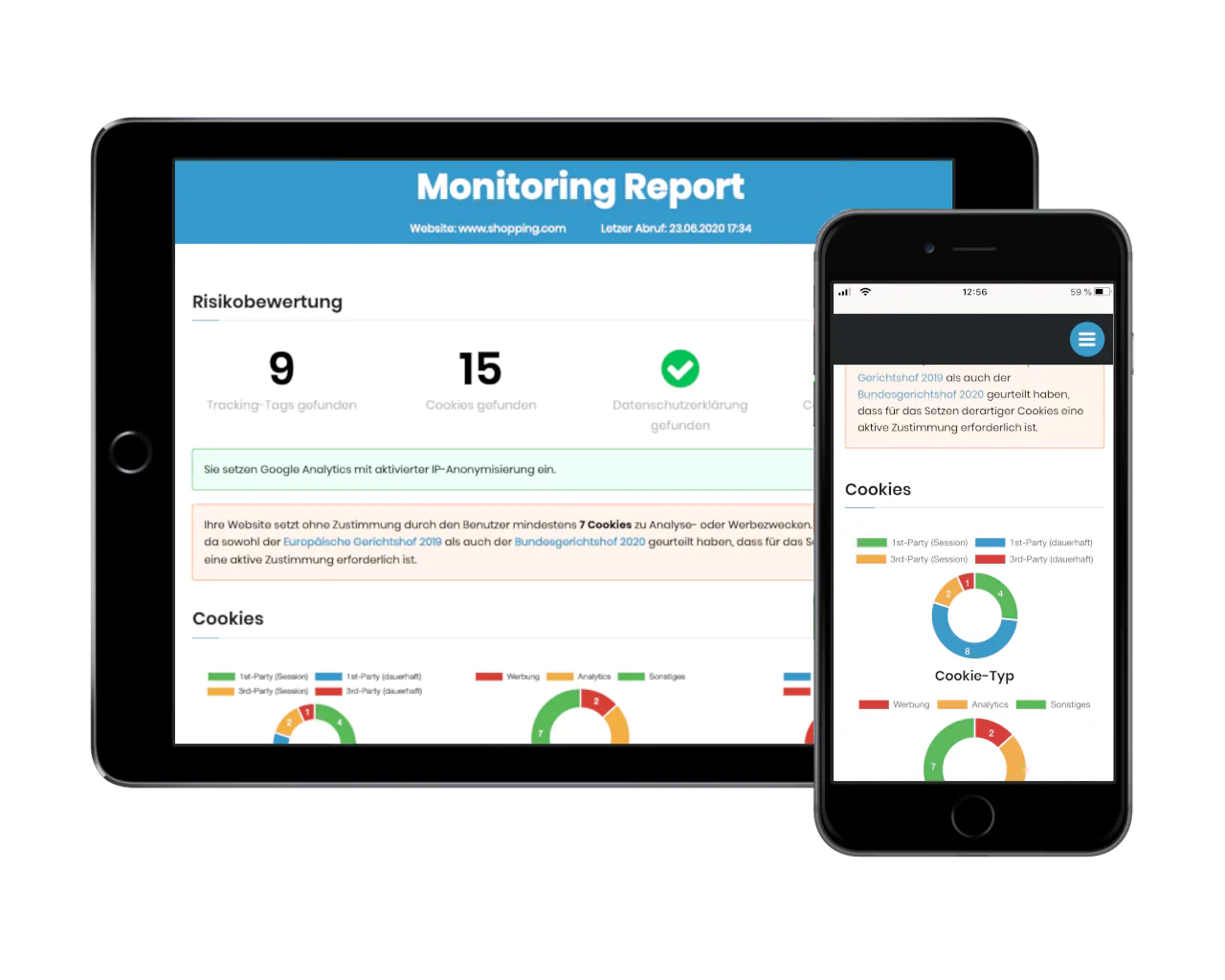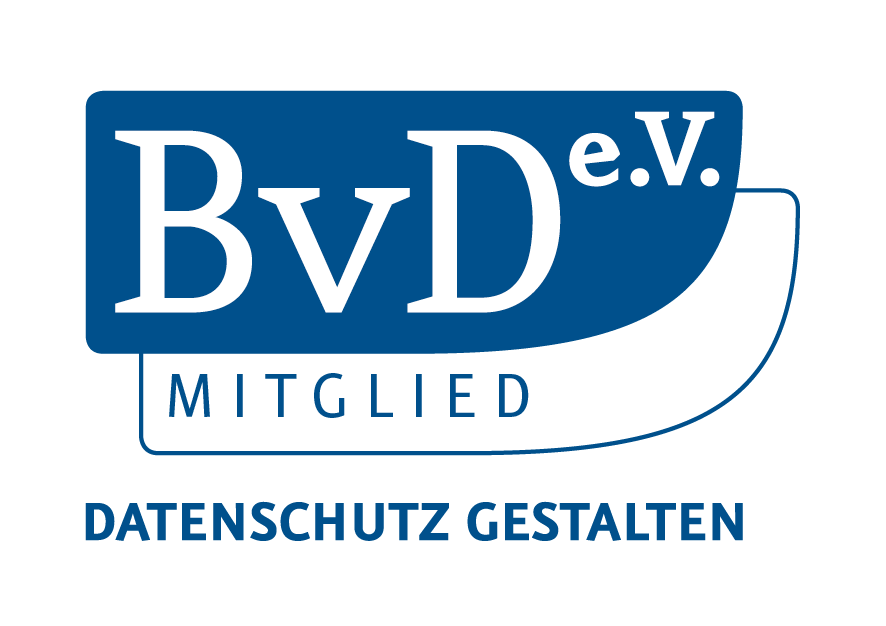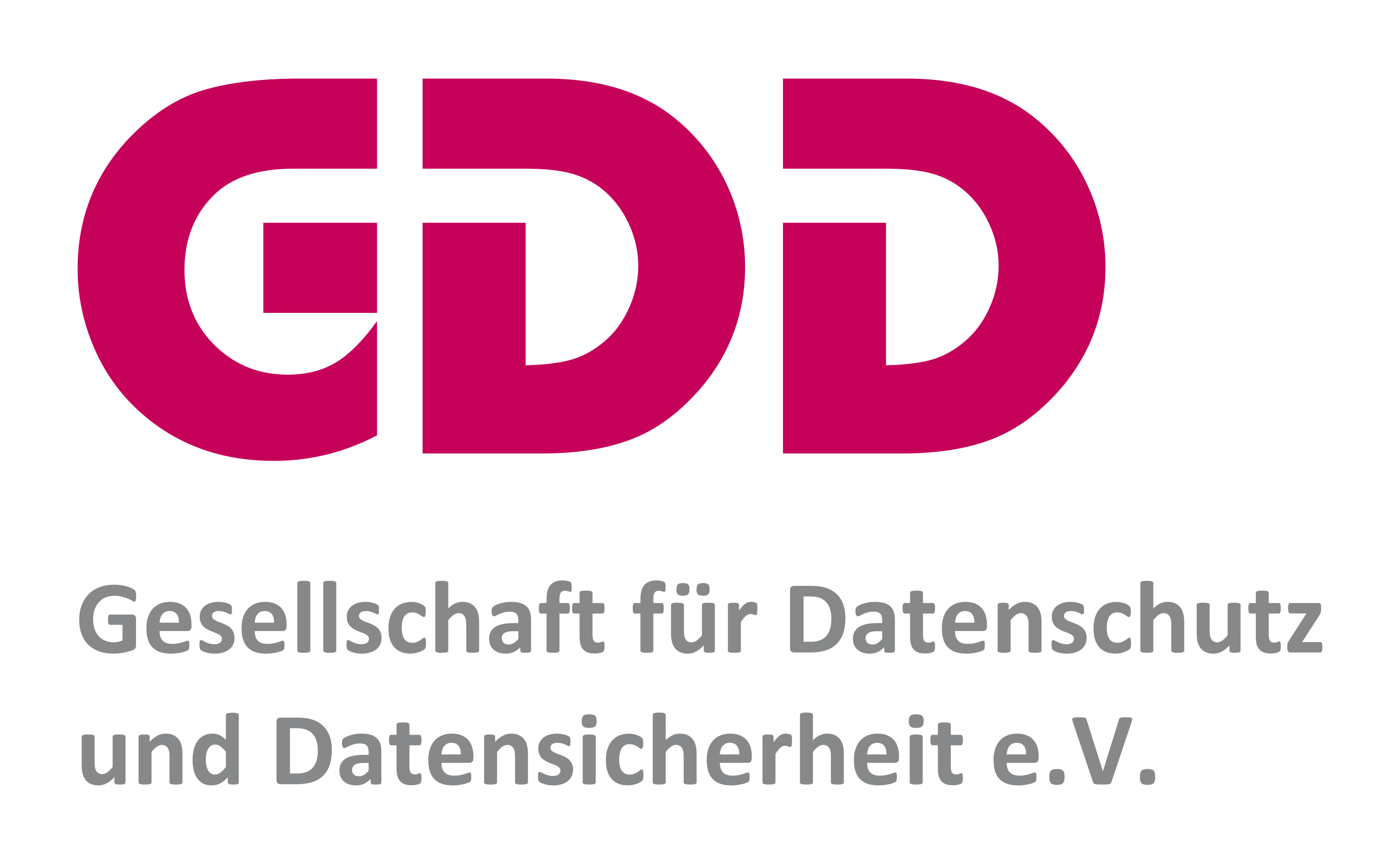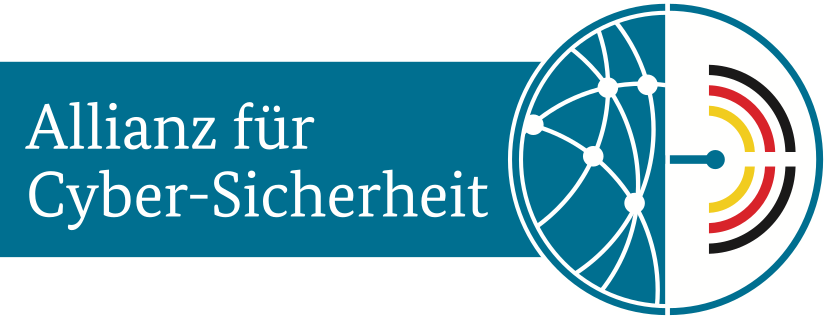Table of Contents
Overview of privacy-compliant tools
Companies and private website providers in Germany and other countries can choose between several web tracking services that meet the requirements of the GDPR and European data protection authorities.
Below, we present these privacy-friendly tracking providers in more detail. In doing so, we address the background of each provider as well as hosting, licensing model, minimal costs, the user identification method(s) used, scope of services, and penetration (estimated based on Google search results).
Econda
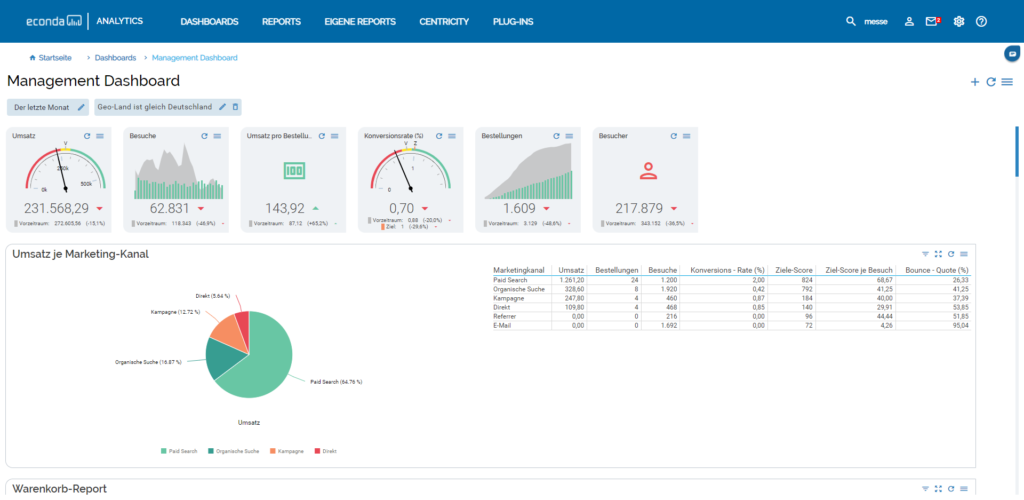
Founded in 2004, the company is headquartered in Karlsruhe. In its first year of business, Econda launched a data analysis solution on the market under the name "Shop Monitor". Since 2009, Econda has carried the annually renewed "Tested Data Protection" seal of TÜV Saarland for the areas of Analytics and Recommendation Services. According to the provider, it has more than 1,000 customers who operate several thousand online stores.
In addition to web analytics, Econda also offers tag management, usability analytics, visitor-centric evaluations, a plug-in center, and fully automated data exchange.
Hosting: Econda's solution is hosted entirely in the cloud.
Licensing model: commercial
Pricing: Econda does not publish cost information on its website. Interested customers must submit a request to the provider.
User recognition methods: Econda uses cookieless methods, external IDs from the customer's online store, for example, as well as custom domain tracking. In this way, the provider can switch off a large part of the widespread adblockers.
Scope of services: The company has made it its self-declared goal to be "more than just a privacy-protected alternative to Google Analytics". Thanks to specially developed Server2Server tracking, it can, for example, record Google ad conversions without the customer having to install the Google pixel on their website. The cloud-based conversion measurement offered by Econda determines both Consent Rate and Consent Gap per channel, campaign, or banner. The methods used capture all visitors to a website, regardless of whether they have agreed to cookies or not. Econda measures post-click conversions purely on a session basis, i.e., without marketing cookies and without personal identifiers.
In addition to Google, Econda says it also supports other services such as Facebook or Bing without having to set platform-specific onsite pixels and associated cookies. In addition, Econda offers a free potential analysis with which interested parties can have their store checked by an employee of the provider.
According to the manufacturer, Econda's solutions are DSGVO and TTSDG compliant. There is no transfer of data to the USA.
Distribution: 2.5 million search results on Google (as of mid-February 2023)
Further information: https://www.econda.de/
Etracker
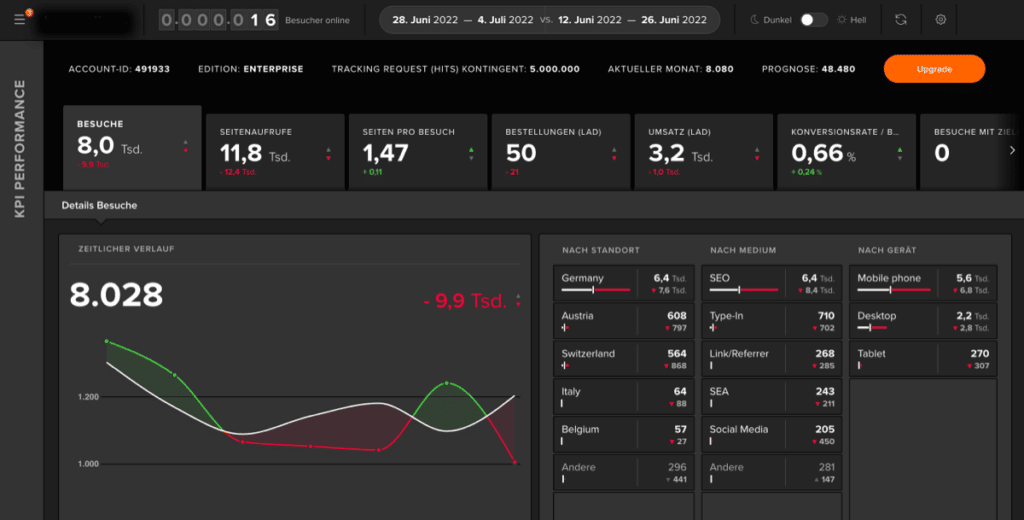
Founded in 2000 by Oliver Krapp and Christian Bennefeld, the Hamburg-based company specializes in web analytics and push marketing automation. Its customers include companies such as Freenet, Lotto Hessen, MyHammer, Osram, Reifen.com and UniCredit. According to Managing Director Olaf Brandt, the legally compliant collection of data is part of the company's philosophy. However, it is not only "about preventing data leaks and penalties, but above all about creating added value beyond statistics and reporting through marketing automation."
In addition to pure web tracking, Etracker also offers app tracking, training, and consulting services.
Hosting: in the cloud.
Licensing model: commercial
Prices: The Basic plan for blogs and content sites starts at 9 euros per month. The Pro-tariff for stores and conversion tracking starts at 19 euros per month and the Enterprise Analytics tariff at 99 euros per month.
User recognition process: Etracker uses a self-developed auto-tracking with session identifiers that are limited to a maximum of 24 hours. Etracker explicitly uses cookies only after the visitor's consent on a tracked website.
Scope of services: Central to Etracker's web tracking is the interactive dashboard. It brings together all relevant metrics and movements in one place. The company also offers dynamic segmentation with filters, comparison options and drill-down functions to reveal further optimization needs.
Etracker supports different types of reports. For example, even the basic reports show how visitor flows change and which content visitors interact with and which they do not. The company automatically records page views, navigation areas and standard events to optimize content and usability.
Also available are marketing reports that allow the customer to check how successful a campaign is. In doing so, Etracker records and evaluates the medium of origin and the referrers. Detected conversions can also be uploaded to Google Ads or Microsoft Ads for evaluation there.
Thirdly, Etracker offers e-commerce reports that, for example, link the campaigns launched with product range analyses to also identify optimization potential. An interesting feature here is the so-called "Renner-Penner analysis", which correlates product interest with actual transactions in a matrix.
Etracker also offers a REST reporting interface and a Looker Studio Connector, which can be used, for example, to access relevant UI data via API to transfer it to the company's own data warehouse or Excel tables. Etracker also offers comprehensive client and user management, which even supports single sign-on.
Distribution: 6.8 million search results on Google (as of mid-February 2023).
Further information: https://www.etracker.com/
Fathom Analytics
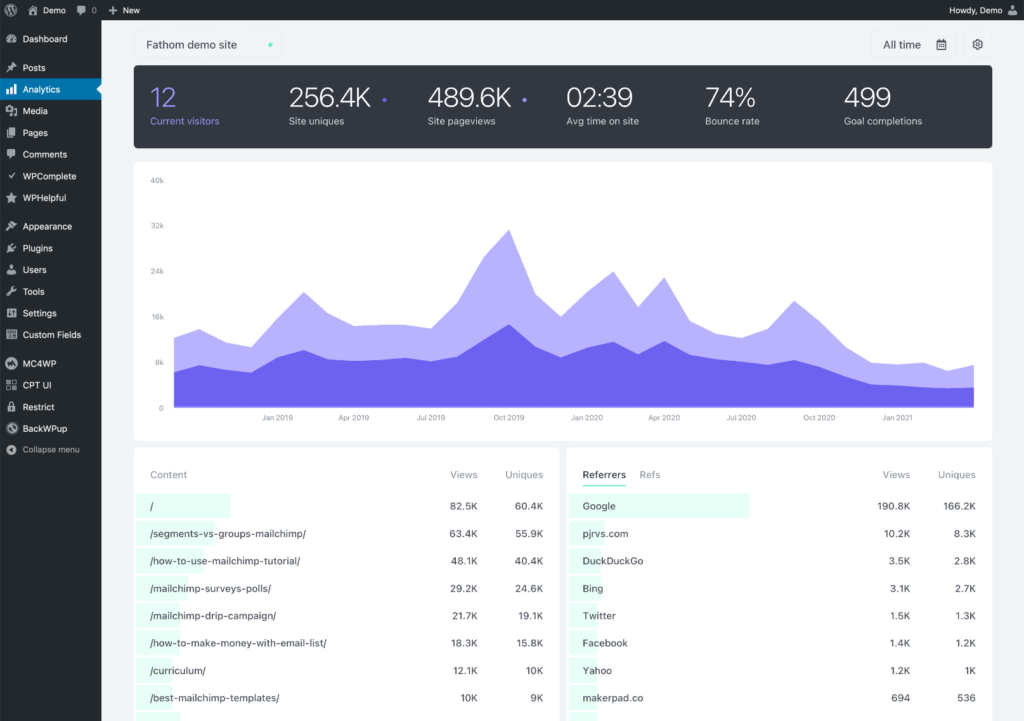
Fathom Analytics is a subsidiary of Canadian provider Conva Ventures, based in British Columbia. The managing directors are Jack Ellis and Paul Jarvis. The European Commission classifies Canada as a safe third country. In addition, Fathom Analytics highlights a feature called "EU Isolation" on its website. It means that all data collected in the EU is hosted and processed only at its partner, German server operator Hetzner. There, all personal data such as the full IP address is removed before the anonymized information is further routed to the company's US servers and processed.
If you don't want that either, you can activate the "Extreme EU Isolation" function. Then no data whatsoever will reach US servers, not even in anonymized form. Fathom Analytics deliberately does not work with cloud providers such as AWS or DigitalOcean, as they are subject to US law despite their existing EU infrastructure.
Hosting: in the cloud.
Licensing model: commercial
Pricing: The cost of integrating Fathom Analytics starts at $14 per month.
User recognition method: Fathom Analytics works Cookieless, so there is no need for embedded cookie banners. Instead, the company uses a bypassing script and subdomains to bypass ad blockers.
Scope of services: Fathom Analytics says it places great emphasis on ensuring that the service does not overwhelm its users with countless data in the dashboard. Instead, the provider creates a single analysis page with all relevant information. Among other things, this contains data on the users currently active on the website, where they are located, and which referrers they used to get to the website.
In addition, there are the most important statistics on total visitors, dwell time, bounce rates, successful events and unique as well as absolute page views. Likewise, Fathom Analytics provides data on browsers used, devices and the countries from which website visitors originate. The service also includes an easy-to-use UTM generator that can be used to add campaign parameters to URLs, for example.
Distribution: 3 million search results on Google (as of mid-February 2023).
Further information: https://usefathom.com/
Matomo
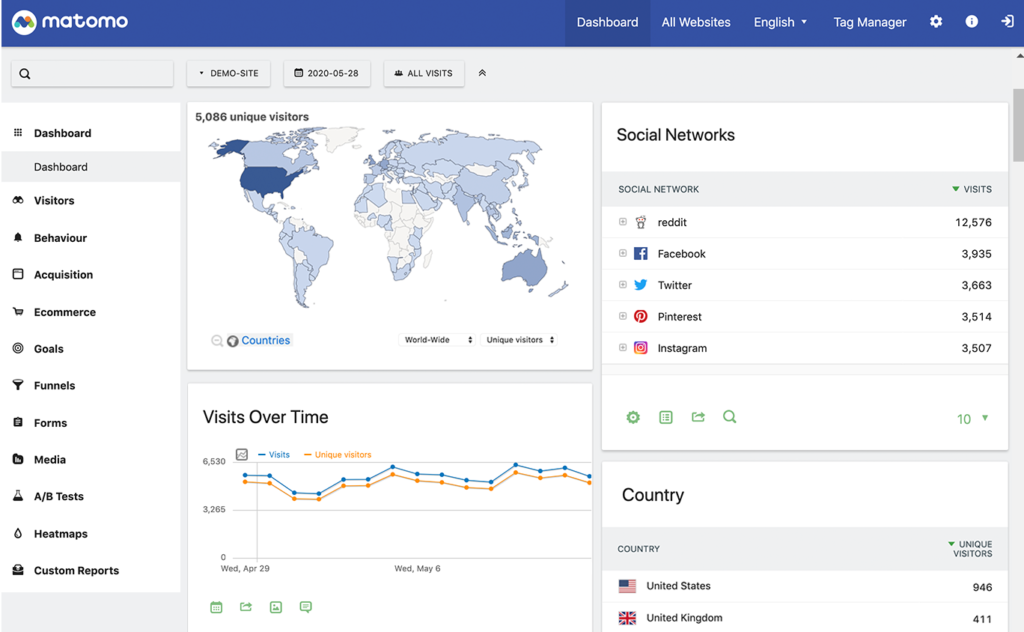
Matomo emerged in 2018 from the Piwik web tracking platform, whose roots themselves date back to 2007. The open-source software is managed by a team led by Matthieu Aubry. Customers can choose whether they want to run Matomo themselves on their own server or prefer to book it as a managed service with guaranteed support. For .de domains, Matomo ranks second after Google Analytics and ahead of Facebook, according to a study by W3Techs.
Among others, the websites Bund.de and the open-source platform Sourceforge use Matomo. More than one million websites in over 190 countries worldwide use Matomo. This is partly due to a suitable WordPress plug-in that facilitates integration.
Since 2021, the MatomoCamp online event has been held once a year with presentations on the open-source solution and web analytics in general. A date for 2023 has not yet been set.
Hosting: Either in the cloud or self-hosted.
Licensing model: Open source
Pricing: Free when self-hosted. From 19 euros per month when hosting in the cloud.
User recognition method: Matomo works in principle Cookieless, but also offers the option of setting first-party cookies.
Scope of services: By default, Matomo tracks data such as the anonymized IP address of the visitor, optionally also a user ID, plus the date and time of the request, information about the pages visited as well as downloads, the screen resolution used, outgoing links clicked on, geolocation data, language, user agent and even how long it took to create and deliver the subpage visited. In addition, Matomo collects optional data such as custom variables, campaigns, site search in puts, and custom events.
The service also has another advantage over Google Analytics: Matomo offers unlimited storage space in principle, while the Google service is limited to a certain number of sessions, depending on the variant.
A special feature is the possibility to create and evaluate visitor profiles. For example, it is possible to investigate why a recurring visitor does not make any purchases. Matomo can also be used to analyze the user experience of visitors, to carry out optimization measures on a website, to improve the search engine ranking or to integrate alternative tracking codes with the newly developed tag manager.
Matomo can be integrated into more than 64 CMS solutions, e-commerce sites and online forums with a plug-in. For other sites and environments, there is a script that can be inserted as an alternative. Cloud users have the option to switch to a local version later as well.
Distribution: 127 million search results on Google (as of mid-February 2023).
Further information: https://matomo.org/
Open Web Analytics (OWA)
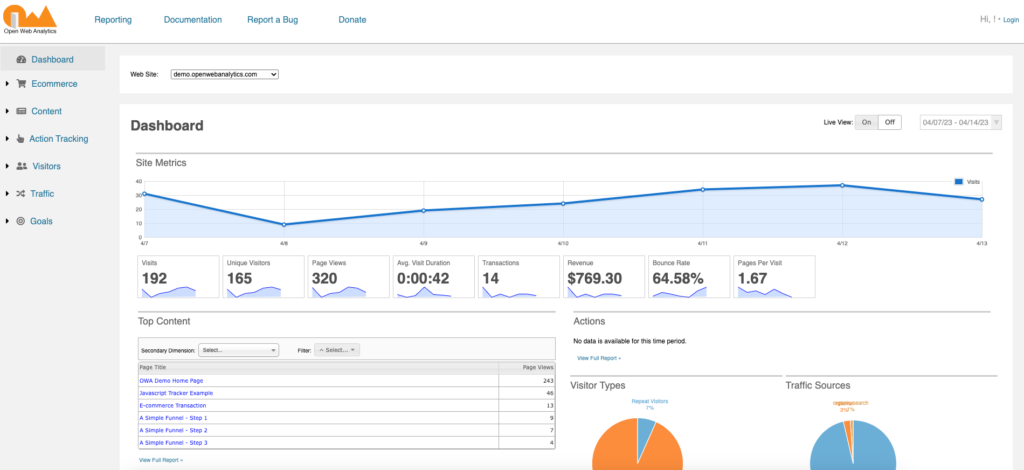
Open Web Analytics (OWA) is another open-source web tracking software that can be run on a dedicated server. Unlike Matomo, however, the developers around Peter Adams do not offer OWA as a cloud solution themselves. However, OWA can be integrated into both WordPress and MediaWiki as a plug-in.
Hosting: Self-hosted only.
Licensing model: Open-Source
Prices: Completely free of charge.
User recognition methods: Open Web Analytics offers a PHP tracker as well as a Javascript tracker for user recognition. Cookies are not set.
Features: OWA supports both WordPress and MediaWiki. With the solution it is not only possible to find out where a visitor clicks on a web page. Heatmaps can also be used to determine where users click most often. To do this, OWA registers mouse movements on the web page and allows tracking the clickstream of (anonymous) users.
Distribution: 1.7 million search results on Google (as of mid-February 2023).
Further information: https://www.openwebanalytics.com/
Piwik Pro
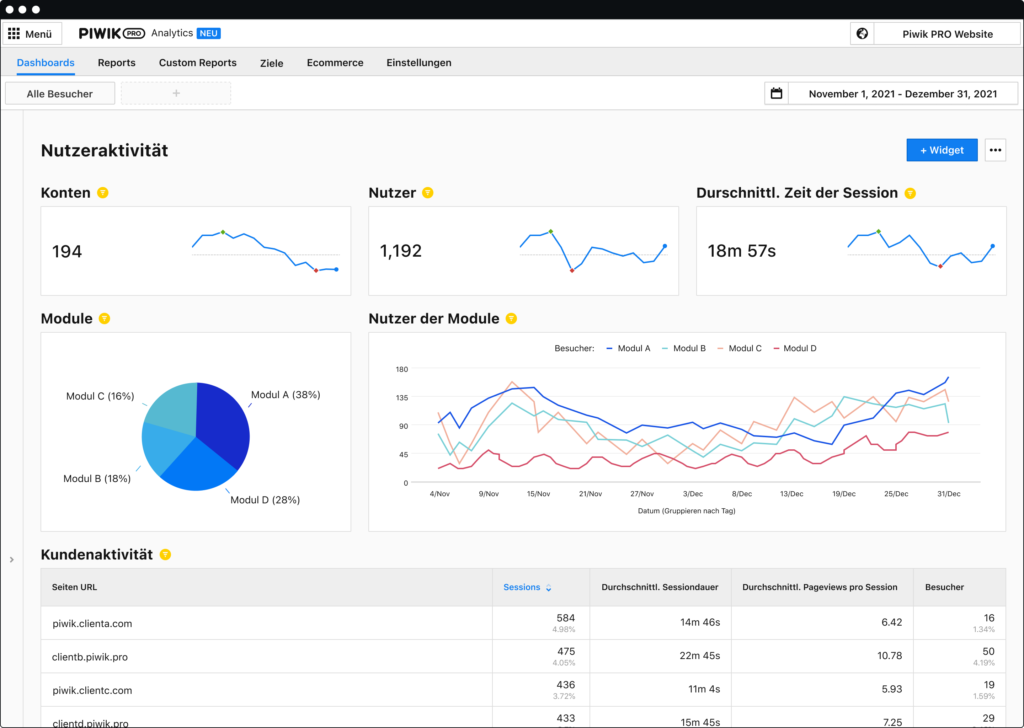
The company Piwik Pro was founded in 2013 as a service provider for the open source solution Piwik (today Matomo, see above). Only three years later, however, Piwik Pro and Piwik parted ways again. Since then, the Berlin-based company has been developing the proprietary web tracking platform Piwik Pro Analytics Suite. According to its own information, the company now employs about 100 people.
Piwik Pro is used by more than 200 customers in over 40 countries. These include well-known companies such as Hewlett-Packard, Accenture and HDI Insurance, as well as the European Commission, for example.
Hosting: Hosting takes place in an EU cloud. Private cloud and on-premise hosting are only available in the Enterprise plan.
Licensing model: commercial
Prices: The Core Plan is free of charge. It contains the three modules Analytics, Tag Manager and Consent Manager and can be booked for up to 500,000 monthly actions. Information about the costs for the Enterprise Plan is available to interested companies on request.
User recognition process: Either cookieless or with cookies that expire automatically after 30 minutes, for example.
Scope of services: According to the provider, Piwik Pro can collect up to 70 percent more data about visitors to a website than Google Analytics, as it bypasses adblockers and users have no option to refuse consent. In addition, Piwik Pro says the Analytics Suite is particularly easy to integrate. A single tracking tag should be enough to switch from Google Analytics to Piwik Pro. The customer can then configure the desired data collection with the tag manager. The switch is also made easier by the fact that both systems use a similar interface.
Piwik Pro also does not sample the collected data, as Google Analytics does, depending on the plan selected. The customer has full access to all their raw data. In this, Piwik Pro is like its competitor Matomo. However, the Berlin-based company says it provides more integrations with external platforms such as Tableau, Google Data Studio or Power BI.
Distribution: 3.9 million search results on Google (as of mid-February 2023).
Further information: https://piwikpro.de/
Plausible Analytics
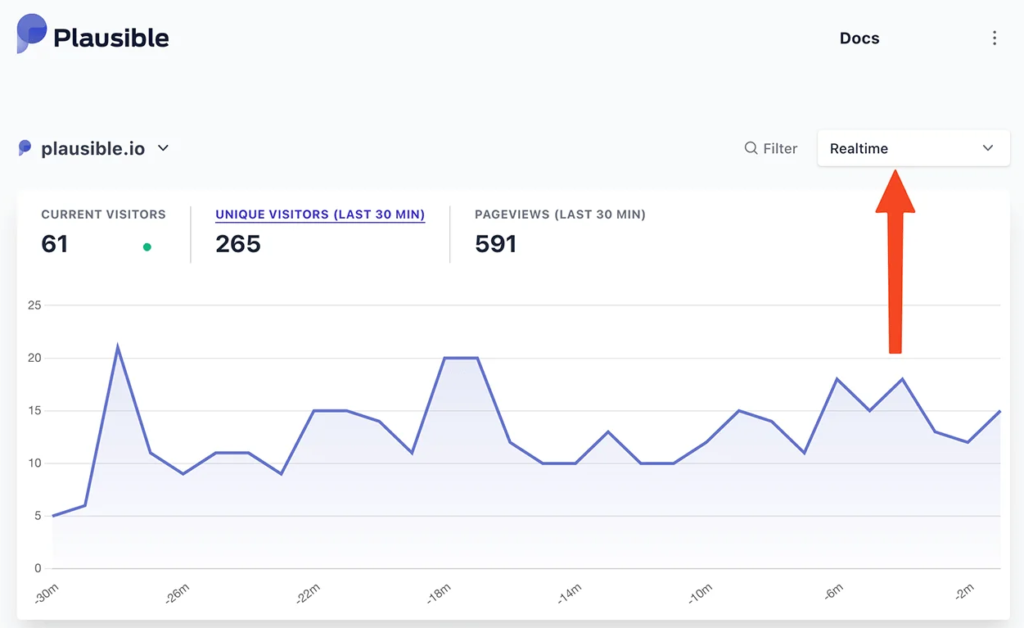
Plausible Analytics is also an open-source platform that is dedicated to privacy-friendly web tracking. Plausible is still a young project. Development started in 2018, and a public beta was first launched in January 2019, followed three months later by the option to rent Plausible Analytics as a cloud solution. In addition, the platform can alternatively be operated on an own server. Unlike other open-source solutions, however, Plausible is still subject to a fee.
Hosting: Either in the cloud or self-hosted.
Licensing model: Open source
Prices: Costs for Plausible start at 9 euros per month.
User recognition method: Plausible Analytics does not set cookies or use persistent identifiers. Once a day, the platform creates a random value for each visitor to still count unique visitors.
Scope of services: Plausible Analytics' privacy-friendly tracking goes so far as to make it impossible to track individual people. Nor can people be identified across multiple devices, browsers, or apps. All data collected by Plausible always relates to a single device, browser, or app. With Plausible, it is therefore also not possible to recognize a user over several days. In addition, Plausible Analytics has a function to publish the collected tracking data on the web.
The Plausible makers have even published a list of 15 marketing measures that they specifically do not support with their solution. These include exit popups or calls-to-action. In addition, there is deliberately no affiliate program, with which other developers want to promote the spread of their platform.
Plausible Analytics focuses on ease of use and an easy-to-understand dashboard. Users can either include a lightweight script of less than one KByte or, in the case of WordPress, use a ready-made plug-in.
Distribution: 30.1 million search results on Google (as of mid-February 2023).
Further information: https://plausible.io/
Trackboxx
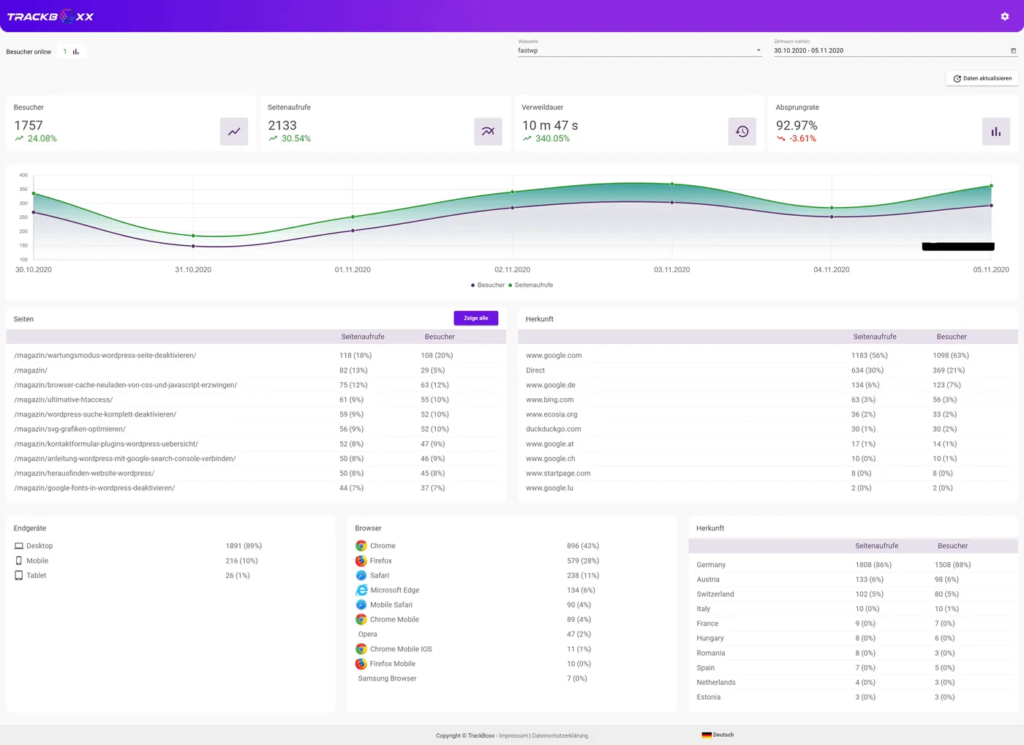
Trackboxx is a relatively small and not yet very well-known provider from Grönwohld in Schleswig-Holstein. Founders and owners of the company are Christian Pust and Ulrike Lehmann. The current (February 2023) version of Trackboxx is 3.7. The first version mentioned on the website is 1.1, which was released at the end of 2020.
Hosting: cloud only.
Licensing model: commercial
Pricing: Costs start at 5 euros per month. Trackboxx also offers a free variant for smaller websites that generate less than 2,500 pageviews per month.
User recognition method: Trackboxx does not store cookies on the computers of website visitors and does not collect or process any personal data. The company creates a unique hash for each visitor, which it automatically deletes after 24 hours. This is intended to make subsequent identification impossible.
Scope of services: The service records data on the number of visitors to a tracked website, where they come from and which devices and browsers they use, and what the bounce rates are. In addition, it is possible to define specific targets with the integrated conversion tracking and then evaluate them.
Trackboxx also supports UTM tracking to track traffic from different sources, structure it and thus understand it better. This makes it possible, for example, to find out how many clicks a post on a social service such as Facebook has brought or how often which links in the newsletter were clicked.
In addition to PDF reports with all essential data, Trackboxx can also generate a publicly accessible dashboard that informs customers and partners about the actual traffic of a website.
Distribution: 2,800 search results on Google (as of mid-February 2023).
Further information: https://trackboxx.com/
Umami
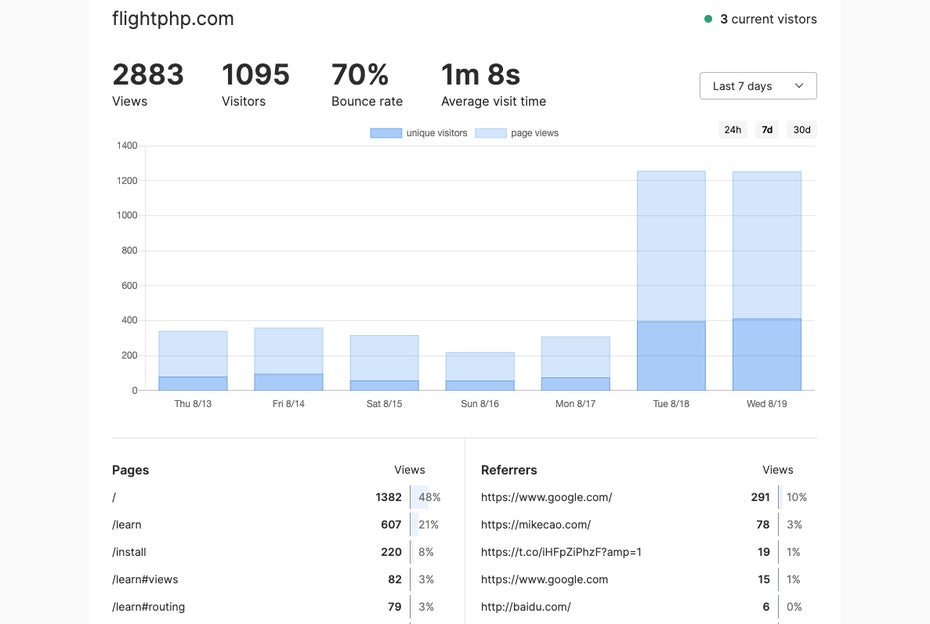
Umami is another open-source solution that can be hosted on its own server. A cloud variant is currently under development. Problematically, the three founders Mike, Brian and Francis Cao publish relatively little information about their company on the Umami website, and only in English. Hosting: So far, Umami can only be operated self-hosted, but a managed cloud solution is currently in preparation and can be tried out in a public beta test.
Licensing model: Open source
Price: Umami can be used free of charge (self-hosted). The costs for the announced cloud solution are not yet known.
User recognition method: The solution does not use cookies, so no cookie banners need to be included. In addition, since Umami is hosted under its own domain so far, it bypasses many adblockers.
Scope of services: The Umami developers have made it their declared goal to collect only the essential data about a website's visitors. In doing so, they not only want to comply with European data protection regulations, but also make their solution easier to use. In addition to registering page views, Umami also supports custom events, which can be used to record clicks on specific buttons, for example. In addition to historical data, live events can also be viewed and evaluated in the dashboard, for example to find out which pages visitors use most frequently to reach the website.
According to the developers, Umami's tracking script is smaller than 2 KBytes. Visitors to a website can also find out about current statistics via a publicly accessible URL. Umami deliberately does not support tracking across multiple websites.
Distribution: 870,000 search results on Google (as of mid-February 2023).
Further information: https://umami.is/
How to perform a GDPR check for analytics tools?
The tracking tools listed above can all be used in a GDPR-compliant manner, if you make sure that they are either configured for use without cookies or are only loaded after consent has been given.
This check is particularly convenient with a GDPR scanner such as decareto Compliance Monitoring. However, it can also be done with the on-board tools of any web browser, the "Browser Developer Tools". This section describes how to do this.
- Use the Chrome browser for this.
- Delete the browser history and open the website you want to examine. If there is a Consent banner on the website, you should see it now.
- Open the developer tools by right-clicking in the web page and selecting "Investigate".
- Open the "Network" tab. Reload the page.
- If the tracking tool is configured to use cookies, there should now be no network call visible here pointing to the tool. If it does not deploy cookies, then this does not apply. An overview of the network calls by which you can recognize the tracking tools can be found in the table below.
- Open the "App" tab and select the "Cookies" menu item in the left navigation.
- No cookie of the tracking tool should be visible in the list. An overview of the cookies set by the tracking tools can be found in the table below.
| Tracking-Tool | Network request or domain | Cookies |
| Econda | econda-monitor.de | emos-session emos-visitor emos_jcsid emos_jcvid |
| Etracker | etracker.com etracker.de | _et_coid BT_pdc BT_sdc |
| Fathom Analytics | usefathom.com | none |
| Matomo | matomo.js or piwik.js or matomo.php in the URL neither matomo.cloud nor piwikpro.com as domain | _pk_ref _pk_cvar _pk_id _pk_ses |
| OWA | owa.tracker-combined-min.js in the URL | owa_s owa_v |
| Piwik Pro | piwikpro.com piwik.pro | _pk_ref _pk_cvar _pk_id _pk_ses |
| Plausible Analytics | plausible.io | none |
| Trackboxx | trackboxx.info | none |
| Umami | umami.js in the URL | none |
Download: Your complete data protection technology guide

How to reliably identify privacy gaps on your customers' websites using free tools.
Download nowAuthor: Andreas Th. Fischer
Andreas Th. Fischer is a freelance journalist and author. He has more than two decades of professional experience in the IT industry and was an editor at NetworkWorld Germany, ComputerPartner and com! professional.


